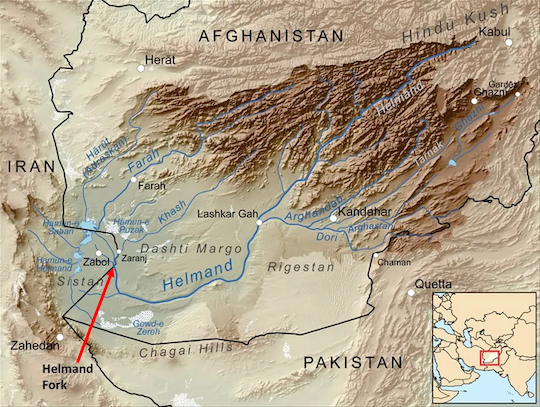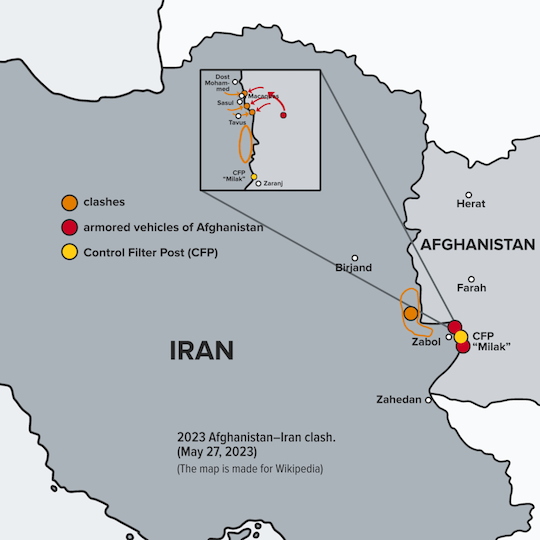Posted September 17, 2023
By Sean Ring
Iran to Afghanistan: “Water You Doing?”
Good morning from lovely Il Piemonte!
I hope you had a restful, relaxing weekend.
Pam and I are taking the train this morning to Turin, where we’ll meet with our bankers regarding this damn house and mortgage again.
This stuff takes forever in Italy, especially since no one shows up for work in August!
But as we were waiting for our bankers and brokers to return from the beach, I watched a fascinating YouTube video from CaspianReport titled, “Why Iran and Afghanistan are headed to war.” Credit to CR, as most of this piece’s information is from Shirvan and his team.
I thought, “Well, who isn’t going to war these days?” My second thought was, “Why would these two?”
I knew they shared a tricky border, but Iran didn’t get too involved in the Afghan War for fear of pissing off the USG even more than it already was.
So, I watched. From the video, I could only come to two conclusions.
The first is countries can’t do anything without water. The second is because of the first, they’re happy to go to war over it.
Unless… unless… they can find a way out if cooler heads prevail.
Before I jump into this specific water rights issue, let me show you the myriad issues going on… on every continent!
The Current Issues
This lists the “Top Ten” current water rights issues besides the Helmand. Some are more pressing than others.
- Nile River Basin: Egypt, Sudan, and Ethiopia have been in a long-standing dispute over constructing and filling the Grand Ethiopian Renaissance Dam (GERD) on the Nile River. This dispute revolves around the allocation of water resources and the potential impacts on downstream countries.
- Tigris and Euphrates Rivers: Turkey, Syria, and Iraq have had ongoing disagreements regarding water sharing from the Tigris and Euphrates Rivers. Turkey's construction of dams and irrigation projects has been a source of tension in the region.
- Mekong River: Countries along the Mekong River, including China, Myanmar, Laos, Thailand, Cambodia, and Vietnam, have been dealing with issues related to water management and dam construction, affecting downstream countries' water availability and ecosystems.
- Indus River: India and Pakistan have had disputes over the sharing of waters from the Indus River system. The Indus Water Treaty has somewhat managed this issue, but tensions still arise.
- Danube River: Various European countries, including Hungary, Slovakia, and Ukraine, have had disagreements over the use and management of the Danube River, particularly regarding water quality and navigation.
- Jordan River: Israel, Jordan, and Palestine have experienced water disputes due to the scarcity of water resources in the region. There have been efforts to find cooperative solutions, but challenges persist.
- Rio Grande/Rio Bravo: The United States and Mexico have a long history of disputes over water use from the Rio Grande/Rio Bravo, particularly during drought.
- La Plata Basin: Argentina, Brazil, Paraguay, and Uruguay have had disputes over the utilization and management of the water resources in the La Plata Basin.
- Niger River: Upstream countries like Mali and Niger have been accused of limiting the flow of the Niger River, affecting downstream Nigeria.
- Rhine River: Germany, France, and the Netherlands have had to cooperate in managing water quality and navigation in the Rhine River.
There are quite a few flashpoints there. The Nile, believe it or not, certainly deserves the top spot. China wanted Tibet so badly precisely because that’s where the Mekong originates. For India and Pakistan, The Indus is just another thing to argue about. The Niger River issue may come to the fore thanks to Niger’s expulsion of the French.
But let’s talk about a problem in a more ancient part of the world.
Ancient Geography
The Helmand River originates in the Hindu Kush mountains of Afghanistan. It flows into Iran's Sistan Basin, a region that has recently faced severe droughts.
The river has been a source of contention between Iran and Afghanistan for over a century. Of course, since the British drew their border, this should be no surprise. It’s about as good a job as the Sykes-Picot Agreement that carved up the western part of the Middle East into European spheres of influence.
The water dispute between the two nations is rooted in the Helmand River Treaty of 1973, which was never ratified. This treaty allocated 820 million cubic meters of water annually to Iran, with the potential for an additional 4 billion cubic meters in times of surplus.

Credit: International Water Law Project Blog
Dam!
However, the situation changed dramatically with the construction of the Kajaki Dam in Afghanistan. This dam impounded 50 million cubic meters of water, preventing it from flowing downstream into Iran.
After the 2020 Doha agreement signaled an American withdrawal, the Taliban's engagement deepened.
The rapid collapse of the Afghan Republic caught many, including the Iranians, off guard. This coincided with the height of the COVID pandemic and widespread water shortages in Iran, leading to nationwide protests and a heavy-handed government response.

Credit: 097ллл - Own work, CC BY-SA 3.0, https://commons.wikimedia.org/w/index.php?curid=135584594
In July 2022, Iran's president, Ibrahim Raisi, pushed Kabul for a greater water share. The Taliban retaliated by initiating the second phase of the Kajaki Dam, threatening to impound another 1 billion cubic meters of water.
This maneuver placed Iran's water security under even more significant strain. A new influx of Afghan refugees heightened tensions, fueling Iran's concerns of separatism in its southeastern regions.
There are, however, areas of mutual interest between the two sides.
Can They Make Peace Before War?
The Taliban has eradicated poppy cultivation, which had soared under the US-installed Afghan Republic. (Surprise, surprise.) Strict enforcement of counternarcotics has seen opium production fall nearly 99% in Taliban strongholds.
Many farmers have switched to wheat, leading to slimmer profit margins and occasional violent clashes between Taliban militants and farmers. By assisting the Taliban, Iran could potentially curb trafficking at its source, easing the strain on its counternarcotics efforts.
Climate change allegedly further complicates the situation. Opium is more lucrative and less water-intensive than conventional agriculture. Any lapse in enforcement could see poppy yields return to their pre-eradication levels within a single season.
For cooperation between the Taliban and Iran, advances in minority rights in eastern Iran are essential. This region has significant anti-Afghan sentiment, primarily due to refugees, border security issues, and an opioid crisis the Iranians see as an Afghan problem.
The Taliban's attempts to establish Pashtun cultural hegemony negatively impacted its Persian-speaking minorities. This includes the suppression of Persian literature and language in favor of Pashto. Concessions on this front are necessary.
Additionally, a properly ratified treaty needs to address the water rights issue. Both Iran and the Taliban share a commitment to the Helmand Water Treaty. But since it was never ratified, Afghanistan, where the water originates, holds the upper hand in negotiations.
The Taliban remains the de facto sovereign authority in Afghanistan, regardless of legal technicalities. Eventually, Iran may recognize the Taliban because it provides greater protection to its ethnoreligious kin within Afghanistan.
This would open dispute resolution procedures available under the Helmand River Treaty. Settling the dispute is in the mutual interest of both parties, as shared security issues necessitate it. Beyond that, neither side can afford new enemies. Their differences are significant in religious, cultural, and ethnolinguistic terms.
In this case, tolerance is a good starting point. Agreement can come later.
Wrap-Up
My friend and colleague Byron King loves to talk about minerals and mining, and for good reason.
But perhaps the earth’s most precious resource deserves more attention.
After all, without water, we wouldn’t have our morning coffee!
Have a wonderful week ahead.

How The Machine Ate Itself
Posted February 04, 2026
By Nick Riso

My Secret to Finding Great Miners… and Avoiding Promoters
Posted February 03, 2026
By Matt Badiali

The Massacre of the Innocents
Posted February 02, 2026
By Sean Ring

METALS MELTDOWN!
Posted January 30, 2026
By Sean Ring

Trump’s Victory at Sea
Posted January 29, 2026
By Byron King

